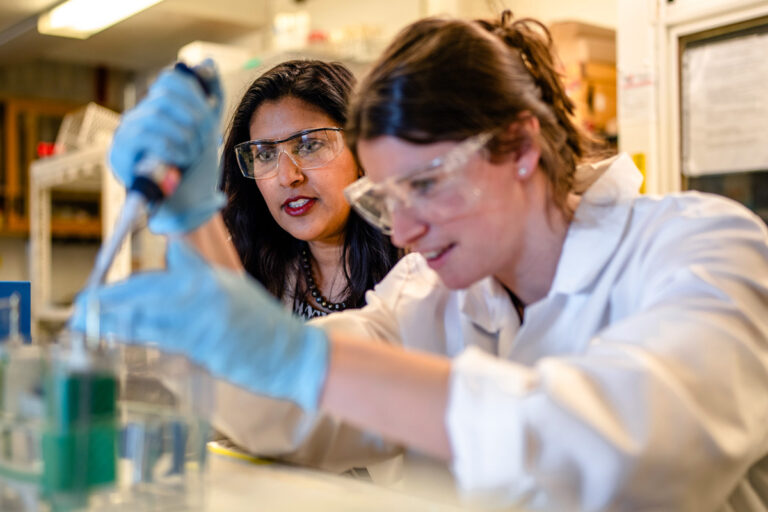
Dr. Abir Bekhet first honed her craft more than 9,500 miles away from Milwaukee.
Born and raised in Egypt, Bekhet has taken her lifelong passion for nursing instruction from the shores of the Mediterranean to the shores of Lake Michigan. Bekhet completed her undergraduate and master’s degrees in Egypt before coming to the United States for her doctorate at Case Western Reserve University in Ohio. She joined Marquette University’s College of Nursing in 2009.
Bekhet’s research focuses on the science of resilience: how people respond to adversity and the influence of positive thinking on physical health. These studies help nurses more fully incorporate mind-body relationships into their treatment plans, particularly when dealing with vulnerable populations.
Marquette teaches the Jesuit tenet of cura personalis – care for the whole person – and Bekhet exemplifies this through her research and teaching.
The following Q&A has been edited for brevity and clarity.
Before we get into your research, tell us a little bit about where you’re from.
I used to live on the seashore in Alexandria, a beautiful city in Egypt. Some people may be familiar with the Library of Alexandria in ancient times. It still has one of the oldest universities in the world.
What was it like to go to school in Alexandria?
Overseas, it’s a little bit different. They rank all the graduates from the college of nursing in Egypt and they choose the first 10 according to grading, then offer you a clinical instructorship paid for by the university, which is quite interesting. I was ranked the second in my class, so I accepted the offer to be a clinical instructor. I’ve been a university professor since I was 21 years old.
What is your line of research and how did you get interested in it?
My research is about how people adjust to adversity and the mind-body relationship. I wanted to study how to cope in the face of adversity. You could call it the study of resiliency and resourcefulness.
During my doctorate, I lost my sister in a car accident when she was living in London. That was a starting point for me to dig deeper into the concept of resiliency. How can I help myself first and then help other populations?
I started by studying older adults in retirement communities; that was my dissertation topic. From there, I kind of spread out more.
Positive thinking is a topic that gets a lot of non-academic attention. What are some of the misconceptions about it that you want to correct?
One of the misunderstandings is that someone can simply become a positive thinker just because they read something about it. That’s not true. You have to practice it. It’s not only knowing the skills that constitute positive thinking, but you also have to put them to use on a regular basis.
It’s not one day or two days to make a change — it’s a lifetime. You’re not going to be a positive thinker in the blink of an eye.
What is a skill or piece of advice that readers could practice right now to help with positive thinking?
One thing you can do is put phrases associated with positive self-talk around your living environment.
For example, if my negative thoughts are telling me that I’m a failure, I would write down that I’m a successful person and then put it all around; on the refrigerator, on the bedframe, everywhere. You need to remind yourself of your good qualities.
I ask the people in my classes for their own ideas for resilience practices, too. They’ll tell me things like “I need to relax before my exam” or “I need to take a deep breath.” Maybe they need to listen to music instead of reviewing everything last-minute. Everybody has a different strategy that works for them.
What are some of the negative health effects associated with negative thinking?
We cannot separate the body-mind relationship. It goes hand in hand. If you’re practicing negative thinking, you can become liable to depression and that’s correlated with many physical conditions, such as increased risk for heart disease, diabetes and high blood pressure.
Many people who have been diagnosed with depressive disorders have later gone on to struggle with hypertension or even a higher risk for cancer. Negativity does not only impact your mental health and well-being, but your physical health too.
How adept are today’s generation of students at practicing resilience techniques as opposed to students from when you first started teaching?
Unfortunately, COVID had a large negative impact. In the post-COVID era, we’ve witnessed more depressive disorders and more anxiety disorders. The last three years have been very out of the ordinary because of the isolation.
Prior to COVID, though, the new generation really supported each other in a positive way. I can’t say that we’ve gotten rid of the stigma of mental health struggles, but I can say that we’ve been taking more positive strides. Today’s students are talking about this stuff openly, which is great. In my generation, we were not talking about mental illnesses and what’s happening in the mind. People were very reluctant to share if they had any kind of mental struggles.
The more you talk about it and bring it to the surface, the more comfortable you are being an advocate for yourself and others who have any sort of mental illness.
Nowadays, it seems like we’re getting back to the pre-COVID normal, so I hope to see more positivity as compared to the last few years.
Is there anything else that you’d like to tell readers that we haven’t talked about yet?
Your state of mind can be a self-fulfilling prophecy. If you wake up in the morning and tell yourself that it’s going to be a wonderful day, there’s a better chance that you’ll actually have a wonderful day.
When you look at a situation, even if it’s mostly negative, ask yourself how you can come up with the positive out of it. If you have an ugly picture, you can put a frame around it to make it beautiful.


